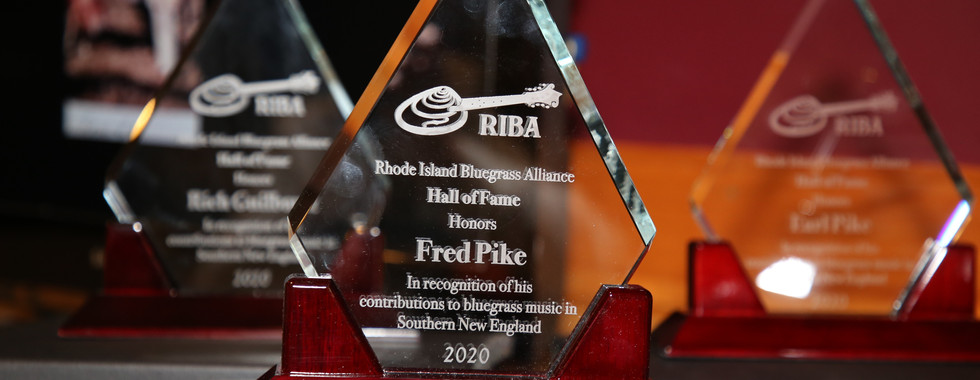Five notable southern New England bluegrass musicians were inducted into the Rhode Island Bluegrass Alliance (RIBA) Hall of Fame on Saturday, November 6th in a ceremony at the Elks Lodge in West Greenwich, RI. This fifth annual event included inductees for 2020 and 2021, selected for their lifetime achievement and contribution to the region’s bluegrass community.
“Southern New England has been home to many important and influential bluegrass musicians and many are unaware of these musicians’ impact on bluegrass music both locally and nationally. We honor these individuals and commemorate their contributions and achievements in the RIBA Hall of Fame,” said Sal Sauco, RIBA President.
The 2020 inductees are:
Richard Guilbault started his bluegrass journey when he learned to play the five-string banjo at the age of 10 years. Now, at 70 years he is still involved with the music and the community he loves.
Richard has used his musical training to play in many different bands over the years and has promoted both bluegrass and country music in a variety of venues.
He is married to Lucille (Lapierre) and they have two wonderful children Rebecca, 43 and Ryan, 41. Both Richard and Lu are currently serving on the board of the Rhode Island Bluegrass Alliance and volunteering whenever and wherever needed.
Earl Pike, the youngest of a family of twelve, six sisters and five brothers, was born May 30, 1934. Earl’s early childhood was spent on the family farm in Sterling, Connecticut. It was during this time that he, along with his brother Fred, began his musical career. They appeared first on radio in early 1944 in Westerly, Rhode Island, and Putnam, Connecticut.
The brothers also worked numerous television and stage shows, appearing with such notables as “Hackshaw Hawkins,” “Big Slim the lone cowboy,” Jerry and Sky” and many others.
Earl’s music career was interrupted by a tragic injury in an accident on the farm. Through grim determination and several operations, Earl was finally able to resume a normal life and the work he enjoyed.
Fred Pike was born on October 27, 1932. He started playing the guitar at the age of eight and by the time he was 12 years old he could also play the dobro, tenor banjo, fiddle and mandolin. It was not until 1958, soon after Earl’s accident, that Fred decided to take up the five string banjo.
During this period, Fred formed a group of his own and they performed on all the major bluegrass shows in the country and with most of the top acts in the business, ranging from Bill Monroe, Reno and Harrell and The Osborne Brothers to Webb Pierce, Lefty Frizell and Bill Anderson.
In January 1968, Fred rejoined Earl for an enduring musical partnership.
The 2021 inductees are:
Nick Anderson went to see the Johnston Mountain Boys in the early 1980s and fell in love with the bluegrass sound. It was not long before Nick and a friend decided to start a band, which they called Bay Mountain. Nick took up the guitar in order to start the band. He soon left that band and took time to hone his musical skill and ultimately formed another band called Shady Creek in 1985.
The original Shady Creek band included Steve Forcier, Jim Plecan and Suzie Gibson. Thirty six years later, over 50 New England musicians have added their flavor of bluegrass and gospel to the Shady Creek Band. They’ve played many festivals and venues along the East Coast and in Canada. The highlight of Nick’s music career was meeting Bill Monroe in the 1980s and having a lengthy conversation with him about prize bulls.
Today, the Killingly Grange is still running bluegrass shows and Nick opens his farm to local musicians in the summer for a weekend gathering that includes a show, potluck meal and picking.
Roger Williams left the military in 1960 and met Jimmy Morin who played mandolin and dobro. They talked about starting a bluegrass band and met with Roger “Bill” Hall who played five-string banjo. The three decided to form Roger Williams, Bill Hall and the Country Cut-ups. Rounding out the band was J.R. Smith on upright bass and Carl Rebello on fiddle. They gained recognition throughout New England.
David Hunter later joined the group on mandolin, until his aviation career “took off.” Since David married Roger’s younger sister, they still had opportunities to jam at family gatherings.
Roger met “Curly” King at the Lone Star Ranch in Nashua, New Hampshire when both were performing there. They struck up a friendship and when Carl left the band, Roger asked Curly to be their fiddle player.
When Bill Hall left, Richard Guilbault stepped in on the five-string banjo. Roger had met Richard and his friends Cathi and Glen Brodeur performing as a trio, all very talented and still in their teens! Glen later joined them on bass and Cathi also joined the band, covering some of the popular female vocalist songs of that time.
Roger’s band continued to play venues throughout New England and opened for Grand Old Opry stars such as Sonny James, Mel Tillis, Hank Snow, Faron Young, Carl Smith, Stonewall Jackson and Red Sovine.
Although his love for bluegrass remained strong, the band slowly transitioned over to Country & Western and became Roger Williams and the Countrymen.
The Rhode Island Bluegrass Alliance's mission is to promote the appreciation of bluegrass music, and serve as a resource to educate and coordinate fans, students, teachers, musicians and venues in Rhode Island and the surrounding area. In addition to sponsoring the RIBA Bluegrass Hall of Fame, the organization also sponsors youth and adult musical education programs and serves as a resource to venues and musicians.





































































Comentarios